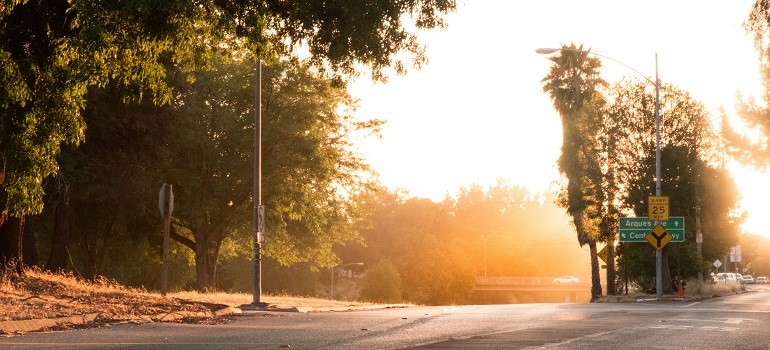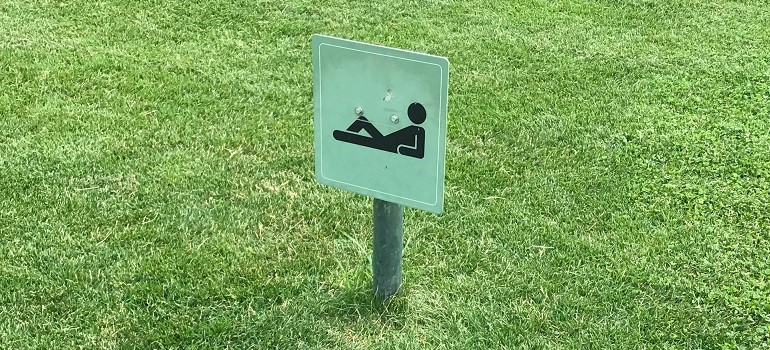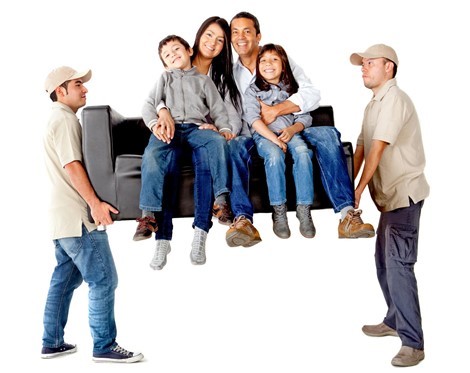So you're planning a big move and trying to find long distance movers that can handle everything you've got. Even if you're the most organized person on the planet, making a long distance move is never simple. You'll want to be sure that everything goes as smoothly as possible. Before you start putting everything in boxes and trying to figure out whether everything is going to fit on the truck, there's one thing you'll need to consider. There are things long distance movers won't move. You can smile, tell jokes, give them compliments, offer them money. But it (probably) won't work. At least not if you're working with a reputable moving company. Partnering with trusted Bay Area moving companies helps you stay informed about what can or cannot go on the truck.
Household plants
If you’re big into plants and have named each of your potted green friends, you're probably not too glad to hear this. There are a few moving companies who might be okay with a plant or two if you're moving to a nearby neighborhood. But as far as intrastate and cross-continental moves, forget about it.

If you can't bear to part with your plant pals, you'll need to plan ahead to figure out how to move them yourself. And be aware that some states are pretty sensitive about plants, for fear of you bringing in bugs or other problems into the state. So you'll want to check ahead. Tips for plant lovers:
- Transport small plants in your car with proper ventilation.
- Avoid watering them on moving day to prevent leaks.
- Check each state’s agricultural restrictions before travel.
- Gift larger plants to neighbors or friends if necessary.
For delicate greenery, consult household movers who can advise on the safest way to prepare your pots and soil for travel. Long distance moves can stress plants easily, so prepare them early and re-pot them after you settle.
Perishable food items
For moves that are picked up and delivered within 24 hours, perishable food items that are properly packed might be allowed.
But generally speaking, long distance movers will not allow perishable food items. Perishable food that goes bad will attract rats and other creatures that could damage your property.
Perishable items include:
- Refrigerated food
- Frozen food
- Produce
- Any opened food products

It should be noted that anything open is considered perishable, regardless of the expiration date. So you'll want to play it safe and pack only sealed food with a long shelf life. These would be things like canned fruits and vegetables and beans, boxed cereals and crackers, and jarred spices.
What to do instead
Donate unopened non-perishables to local shelters or food banks. Plan your meals to use up groceries before the move. Using professional packing services in Bay Area can help you organize your kitchen safely and avoid loading items that may spoil or leak. Keeping a small cooler for snacks on travel day ensures you have fresh food when you arrive.
Pets
It would be nice to live in a world where this is obvious. But there are always people who will insist that their snake or hermit crab or albino gecko actually prefer long stays in the dark. Insist all you want, but long distance movers aren't tucking any of your pets into the dark corners of the truck.
Safe travel for pets
Arrange transport separately for animals. Small pets can ride in your car using secure carriers. For larger pets, contact a licensed pet transport company. Before moving from your apartment, ask apartment movers in Bay Area for pet-friendly scheduling tips, so animals aren’t stressed by noise or commotion.

Schedule vet visits before the move for vaccinations and travel health certificates. Bring comfort items like blankets or toys. Once at your new home, set up a quiet room where your pets can adjust before exploring the rest of the space.
Hazardous materials
Most movers will give you a list of the hazardous materials that long distance movers won’t move. Essentially, anything that you can't dispose of in your regular trash collection is not going to be movable. Here are some of the things that are considered hazardous which might surprise you:
- Fire extinguisher
- Nail polish/nail polish remover
- Aerosols
- Paint/paint thinner
- Ammonia
- Pesticides
- Propane tanks
- Pool chemicals
- Motor oil
If you can't use up any of these items or pawn them off on the neighbors, then be sure to dispose of them properly before you move.
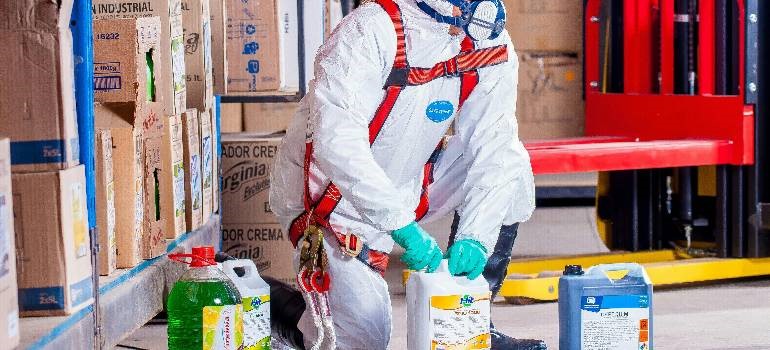
Proper disposal advice
Contact your city’s waste management center to ask where to drop hazardous items. Many have free collection days. Experienced long distance movers in Bay Area crews follow strict rules for safety, so remove flammable or chemical materials before they arrive. You’ll protect the movers and your household goods by clearing all hazardous or reactive substances ahead of time.
Explosives
Right along with the obviousness of not packing up your pets, it should go without saying that long distance movers are not going to transport explosives. This includes ammunition, black powder, primers, propellants and any collection of souvenir explosives.
How to handle them safely
If you own firearms or ammunition, talk to local law enforcement or a licensed dealer. Some ranges and police departments offer disposal programs. Never try to move ammunition or explosives yourself across state lines without authorization. It’s both unsafe and illegal. Even if you’re using full service moving services, confirm these restrictions before loading day to avoid any misunderstandings or delays.
Flammable items
Right in line with the hazardous materials and explosives above, anything that's easy to ignite will not be moved by long distance movers. These include kerosene, lighter fluid, and even seemingly harmless items like charcoal and matches.

Safer options
Use up or properly dispose of all flammable products before your move. For small lighters or candles, pack them separately and take them in your personal luggage if allowed. Professional furniture movers in Bay Area teams often suggest keeping similar materials apart from boxes or padding to avoid risk. Replace any flammable products once you arrive to ensure safety during your relocation.
Acids
Okay, you may not have gallons of muriatic acid and nitric acid in your garage. But another place you'll find acid is in batteries. And this includes household batteries, as well as car batteries. As long as those batteries contain acid, they will not be moved. The exception to this is if the batteries are the absorbed glass mat (AGM) or gel-type that cannot be spilled.
Battery safety tips
Remove all batteries from small electronics and pack them separately. For larger batteries, ask recycling centers for disposal options. If you plan to store your equipment, coordinate with Bay Area storage specialists who can help you safely keep non-hazardous items until your new space is ready. Mark sealed batteries clearly to avoid confusion and handle them carefully to prevent leaks that could damage other belongings.

Valuables and documents
Some movers have strict policies about this, while others are more relaxed. Whatever the case, it's in your best interest to keep any valuables with you at all times during the move. Even if your moving company allows for the transport of valuables and will reimburse you for any lost items, they’re often things that have sentimental value and cannot really be replaced. Valuable items might include:
- Family photos/videos/DVDs
- Laptops/Computer equipment
- Jewelry
- Heirlooms
- Antiques
- Collections (stamps, coins, etc.)
- Documents (bonds, deeds, stocks, wills, etc.)
- Cash
Protecting valuables
Carry these items yourself in a locked, fireproof container. Store digital files securely in the cloud. Keep vital papers like passports or medical records with you. Having direct control prevents losses that insurance can’t replace.
Fuel-powered equipment
Okay, that's not 100% accurate. Most moving companies will move the equipment, but only if every last ounce of fuel is removed. Among the equipment that long distance movers will not move until the fuel is drained are:
- Motorcycles
- Snow blowers
- Leaf blowers
- Lawn mowers
- Weed eaters
- Edgers
To ensure that the movers will be able to move these items, you have either manually drain the fuel, or run them until the fuel reserve is completely empty. And you'll need to do this at least 24 hours before loading.
Preparing your tools
Clean equipment thoroughly and wipe away oil or residue. Label the machinery “fuel drained” for movers to verify safety. Store the drained fuel in approved containers or dispose of it at a recycling center. Following these steps keeps your load compliant and avoids safety issues on the truck.
Special items
Are you wondering what you're going to do with that pool table, hot tub or baby grand piano? What about your car? Again, this one will depend on the company.
Some full-service companies are okay with moving extremely heavy items, while others will require you to find an alternative method.
How to handle large items
Contact your mover early to confirm if they manage oversized or delicate pieces. Specialized movers use cranes, dollies, or padded crates to protect them. If you own a vehicle or large instrument, secure a separate transport service. Always ask for insurance coverage for high-value pieces. Planning early ensures everything fits your schedule.
What to expect when you arrive
Yes, there's always a lot to be done before making a big move. But with proper organization and planning, you can make that long distance move an exciting adventure rather than a stressful disaster.
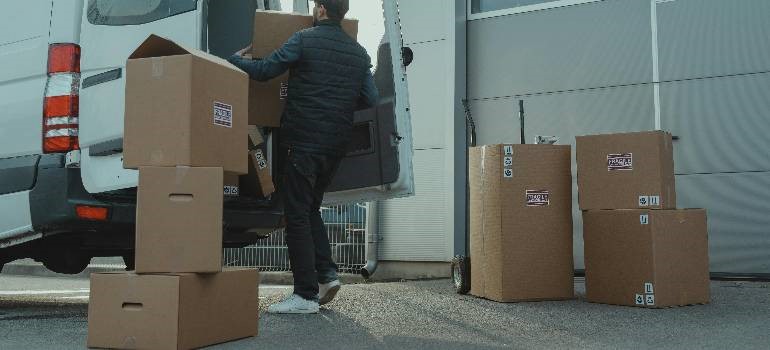
And here's one more thing to keep in mind. If you have difficult stairs to maneuver, you'll want to let those movers know. They're more than happy to move your items on and off the truck and to and from your home. But as soon as it requires transporting those things up a rusted out spiral staircase, or a staircase with broken steps, they're no longer game. Can you blame them?
After unloading the things long distance movers won't move
When you arrive, inspect your belongings before signing delivery papers. Note any missing or damaged items immediately. Keep essentials like toiletries, chargers, and clothing in a “first night” box so you can settle quickly. Planning ahead helps you start life in your new home without frustration.
Quick checklist before movers arrive
Before the moving truck shows up:
- Walk through every room.
- Identify anything movers won’t take and separate it.
- Drain fuel, empty fridges, and set aside plants and valuables.
- Clearly label boxes and remove tripping hazards.
If you’re unsure about specific items, ask your moving coordinator ahead of time. The clearer your inventory, the smoother your loading day will be.
Relocate the things long distance movers won't move with ease
Knowing the 10 things long distance movers won't move saves you from costly surprises. From plants and pets to hazardous materials and valuables, every restriction exists for safety. With smart preparation and early planning, you can handle restricted items responsibly and keep your relocation efficient. Communicate with your movers, ask questions early, and confirm what’s allowed. When you prepare properly, your move becomes less stressful and more predictable — the best way to start life in your new home.
Tags
Subscribe to Upline Moving's Blog
